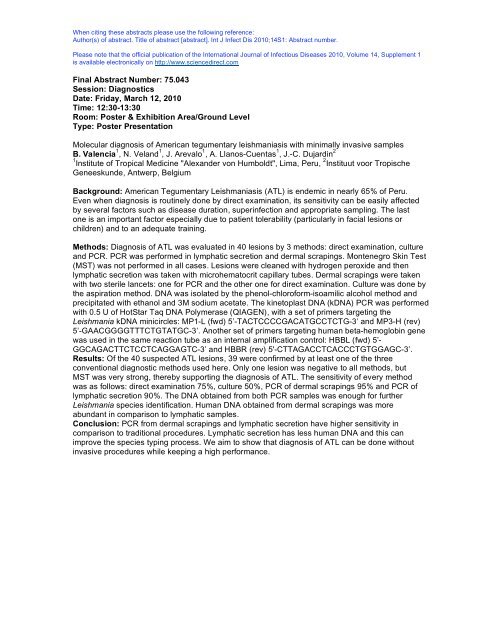14th ICID - Poster Abstracts - International Society for Infectious ...
14th ICID - Poster Abstracts - International Society for Infectious ...
14th ICID - Poster Abstracts - International Society for Infectious ...
You also want an ePaper? Increase the reach of your titles
YUMPU automatically turns print PDFs into web optimized ePapers that Google loves.
When citing these abstracts please use the following reference:<br />
Author(s) of abstract. Title of abstract [abstract]. Int J Infect Dis 2010;14S1: Abstract number.<br />
Please note that the official publication of the <strong>International</strong> Journal of <strong>Infectious</strong> Diseases 2010, Volume 14, Supplement 1<br />
is available electronically on http://www.sciencedirect.com<br />
Final Abstract Number: 75.043<br />
Session: Diagnostics<br />
Date: Friday, March 12, 2010<br />
Time: 12:30-13:30<br />
Room: <strong>Poster</strong> & Exhibition Area/Ground Level<br />
Type: <strong>Poster</strong> Presentation<br />
Molecular diagnosis of American tegumentary leishmaniasis with minimally invasive samples<br />
B. Valencia 1 , N. Veland 1 , J. Arevalo 1 , A. Llanos-Cuentas 1 , J.-C. Dujardin 2<br />
1 Institute of Tropical Medicine "Alexander von Humboldt", Lima, Peru, 2 Instituut voor Tropische<br />
Geneeskunde, Antwerp, Belgium<br />
Background: American Tegumentary Leishmaniasis (ATL) is endemic in nearly 65% of Peru.<br />
Even when diagnosis is routinely done by direct examination, its sensitivity can be easily affected<br />
by several factors such as disease duration, superinfection and appropriate sampling. The last<br />
one is an important factor especially due to patient tolerability (particularly in facial lesions or<br />
children) and to an adequate training.<br />
Methods: Diagnosis of ATL was evaluated in 40 lesions by 3 methods: direct examination, culture<br />
and PCR. PCR was per<strong>for</strong>med in lymphatic secretion and dermal scrapings. Montenegro Skin Test<br />
(MST) was not per<strong>for</strong>med in all cases. Lesions were cleaned with hydrogen peroxide and then<br />
lymphatic secretion was taken with microhematocrit capillary tubes. Dermal scrapings were taken<br />
with two sterile lancets: one <strong>for</strong> PCR and the other one <strong>for</strong> direct examination. Culture was done by<br />
the aspiration method. DNA was isolated by the phenol-chloro<strong>for</strong>m-isoamilic alcohol method and<br />
precipitated with ethanol and 3M sodium acetate. The kinetoplast DNA (kDNA) PCR was per<strong>for</strong>med<br />
with 0.5 U of HotStar Taq DNA Polymerase (QIAGEN), with a set of primers targeting the<br />
Leishmania kDNA minicircles: MP1-L (fwd) 5’-TACTCCCCGACATGCCTCTG-3’ and MP3-H (rev)<br />
5’-GAACGGGGTTTCTGTATGC-3’. Another set of primers targeting human beta-hemoglobin gene<br />
was used in the same reaction tube as an internal amplification control: HBBL (fwd) 5’-<br />
GGCAGACTTCTCCTCAGGAGTC-3’ and HBBR (rev) 5'-CTTAGACCTCACCCTGTGGAGC-3’.<br />
Results: Of the 40 suspected ATL lesions, 39 were confirmed by at least one of the three<br />
conventional diagnostic methods used here. Only one lesion was negative to all methods, but<br />
MST was very strong, thereby supporting the diagnosis of ATL. The sensitivity of every method<br />
was as follows: direct examination 75%, culture 50%, PCR of dermal scrapings 95% and PCR of<br />
lymphatic secretion 90%. The DNA obtained from both PCR samples was enough <strong>for</strong> further<br />
Leishmania species identification. Human DNA obtained from dermal scrapings was more<br />
abundant in comparison to lymphatic samples.<br />
Conclusion: PCR from dermal scrapings and lymphatic secretion have higher sensitivity in<br />
comparison to traditional procedures. Lymphatic secretion has less human DNA and this can<br />
improve the species typing process. We aim to show that diagnosis of ATL can be done without<br />
invasive procedures while keeping a high per<strong>for</strong>mance.
















